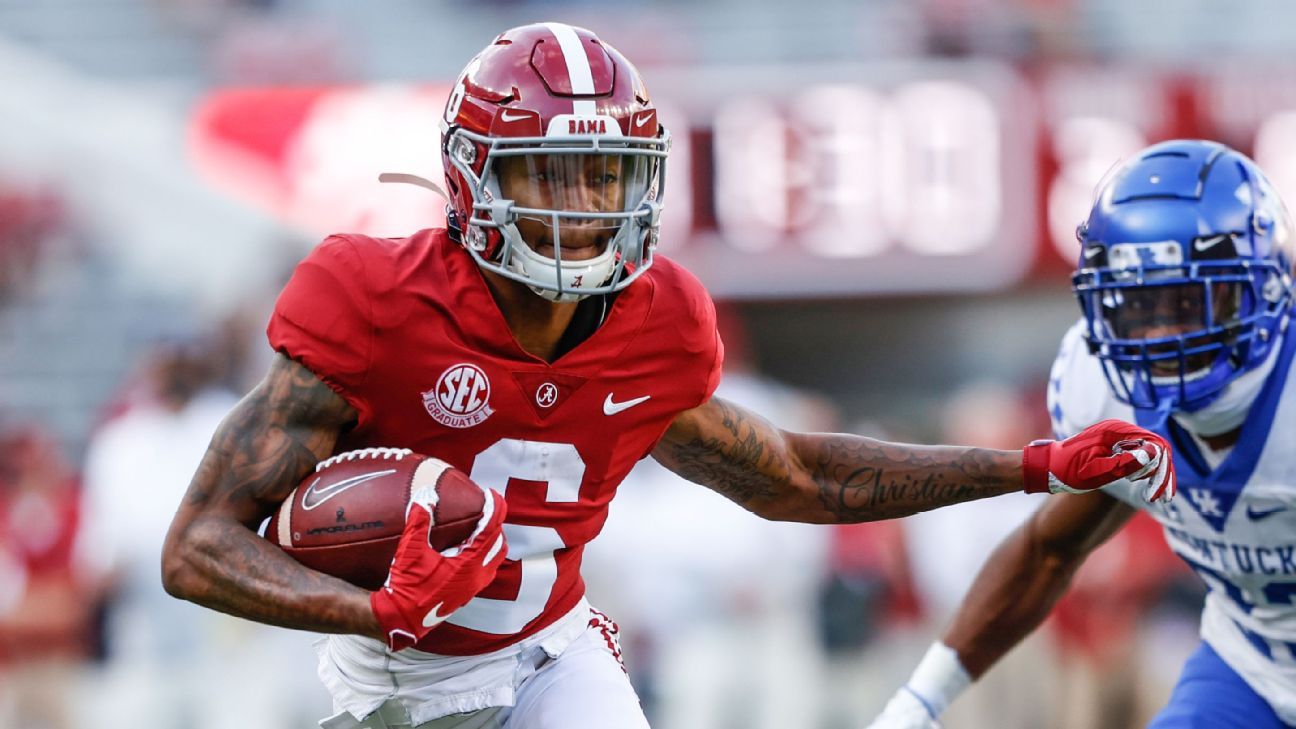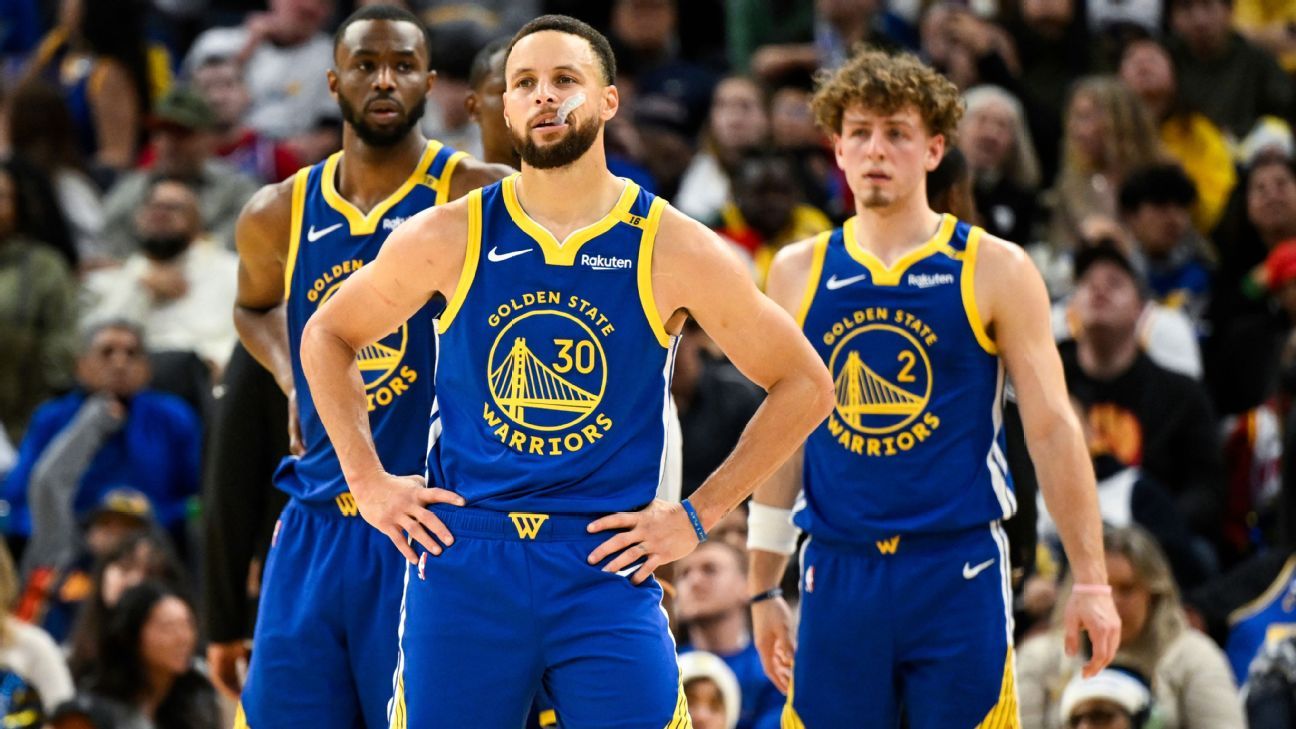
For nearly three decades, wide receivers failed to win the Heisman Trophy. That ended on Tuesday night when Alabama senior DeVonta Smith was presented the award during a virtual ceremony on Tuesday night.
Smith became the third player from Alabama to claim college football's most prestigious award, and the first receiver to win it since Michigan's Desmond Howard in 1991. Smith beat out three other finalists, all of whom were quarterbacks: Alabama's Mac Jones, Clemson's Trevor Lawrence and Florida's Kyle Trask.
Smith won the award with 1,856 points. Lawrence was second (1,187), Jones was third (1,130) and Trask was fourth (737).
Smith called the award a blessing, thanking his parents, coaches and teammates during a short speech at Alabama's football facility. Wearing a sharp burgundy blazer and bow tie, he spoke about the power of self-belief, reflecting on coming from the small town of Amite, Louisiana, and how he was doubted because of his size.
Despite standing a slight 6-foot-1 and weighing 175 pounds, Smith became the best wide receiver and the most accomplished player in college football. He leads the FBS in receptions (105), receiving yards (1,641) and receiving touchdowns (20). He's dropped only two passes all season long.
And like the previous receiver to win the Heisman, Smith is more than just a pass-catcher. He rushed for one touchdown and returned a punt for another score this season. Along the way, he set an SEC record for career touchdowns and an Alabama record for career receiving yards.
Last week, Smith was named The Associated Press Player of the Year, becoming the first receiver to win the award.
Not bad for a skinny kid from Tangipahoa Parish, who in high school would drop to the floor and do pushups whenever he saw his reflection because he thought he was too small to play college football.
"Tay-Tay," as he's known back home, got stronger but remained a relative featherweight compared to other big-bodied receivers. Because of his slight build, strong hands and skill as a route runner, he'd draw comparisons to former Indianapolis Colts great Marvin Harrison.
At Alabama, coaches and players would call him simply "Smitty." But he also picked up the nickname of the "Slim Reaper" along the way.
During his Heisman acceptance speech, Smith took a moment to address kids like him.
"To all the young kids out there that's not the biggest, not the strongest, just keep pushing because I'm not the biggest," he said. "I've been doubted a lot just because of my size. Really, it just comes down to you put your mind to it, you can do it. No job is too big."
As a freshman, Smith achieved national recognition when he caught the game-winning pass in overtime of the 2018 College Football Playoff title game against Georgia. The iconic play -- known forever as "2nd-and-26" -- could have defined his career, but the reserved Smith shied away from reliving it whenever it was brought up. As he'd say later, "I don't too much care about the catch no more. It's a new year. We're moving on."
However, as a sophomore, injuries would hamper his development and he was largely overshadowed by the emergence of teammates and fellow star receivers Jerry Jeudy, Henry Ruggs III and Jaylen Waddle. Even after scoring 14 touchdowns as a junior, Smith managed to fly under the radar.
But this season changed all that. Jeudy and Ruggs departed for the NFL, and Waddle, who was one of the most dynamic playmakers in college football, was lost to an ankle injury four games into the season.
Smith wasn't even on the Heisman odds board at Caesars Sportsbook until after Waddle was injured in late October, where he was posted at 60-1. But with Waddle sidelined, Smith became the focal point of the passing game, and excelled in the spotlight.
A week after Waddle's injury, Smith scored four touchdowns in a win over Mississippi State. He'd score a pair of touchdowns in each of the next two games against Kentucky and Auburn, before returning home to Louisiana and scoring three times against LSU.
Smith has excelled in postseason play, finding the end zone twice against Florida in the SEC championship game and three more times against Notre Dame during the CFP semifinal at The Rose Bowl Game Presented by Capital One.
After the top-ranked Crimson Tide beating the Fighting Irish to advance to the CFP title game, Alabama coach Nick Saban called Smith a "talented guy" and a "hard worker."
"He does everything exactly right," Saban said. "He has a great understanding of what he needs to do to make plays, and he makes them every chance he gets. So we're very fortunate to have him."
Saban, who is not prone to make comparisons, said that Smith has done "as much this year for our team as any player that we've ever had."
Jones, who threw for 4,036 yards and 36 touchdowns this season, called Smith "the most electric player in college football."
ESPN NFL draft expert Mel Kiper Jr. lists Smith as the fourth-best player on his Big Board, and the No. 1-rated wide receiver.
"He means the most to us here at Alabama," Jones said. "You can watch the games and see that, what type of person he is with how he plays. I've been real excited just to be able to get him the ball this year. He came back to try and win a national championship and improve his draft [stock], and I feel like he's done exactly that because he's just gotten open and made explosive plays."
A reserved and often shy speaker, Smith said he never imagined that he'd win the Heisman. Friends and teammates would bring it up and he'd brush it off as a possibility. If anything, he said he felt relieved that it was over.
Smith's acceptance speech was just under two minutes, and he spent much of it thanking others, whether it was his parents; mentor Vince Sanders; Saban; his position coach, Holmon Wiggins; or athletic trainer Jeff Allen. He even thanked athletic director Greg Byrne and Alabama president Stuart Bell.
"Thank my teammates," Smith said. "With team success comes individual success. So without y'all, I wouldn't be where I am today, winning this award."
Heisman Trophy in hand, the only thing left to do now is for Smith to end his career the way it began: by competing for a national championship.
Smith is 1-1 in championship games in his career, and on Monday he'll look to break that tie with a victory against Ohio State in the CFP title game.
"The two main reasons I came back was to get my degree and win a national championship," he said. "I checked one box and I'm trying to check the other now."















 Phone: (800) 737. 6040
Phone: (800) 737. 6040 Fax: (800) 825 5558
Fax: (800) 825 5558 Website:
Website:  Email:
Email: 






